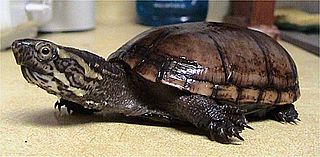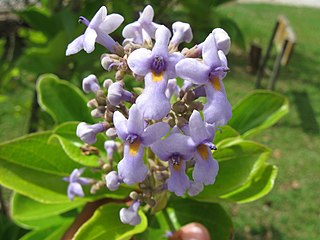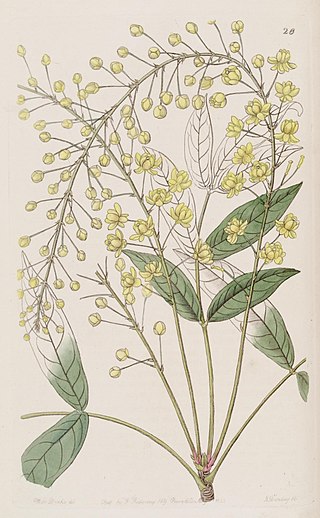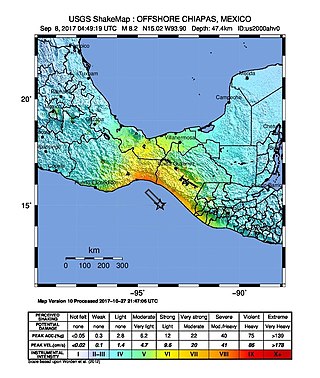
The geography of Mexico describes the geographic features of Mexico, a country in the Americas. Mexico is located at about 23° N and 102° W in the southern portion of North America. From its farthest land points, Mexico is a little over 3,200 km (2,000 mi) in length. Mexico is bounded to the north by the United States, to the west and south by the Pacific Ocean, to the east by the Gulf of Mexico, and to the southeast by Belize, Guatemala, and the Caribbean Sea. The northernmost constituent of Latin America, it is the most populous Spanish-speaking country in the world. Mexico is the world's 13th largest country, three times the size of Texas.

The Isthmus of Tehuantepec is an isthmus in Mexico. It represents the shortest distance between the Gulf of Mexico and the Pacific Ocean. Before the opening of the Panama Canal, it was a major overland transport route known simply as the Tehuantepec Route. The name is taken from the town of Santo Domingo Tehuantepec in the state of Oaxaca; this was derived from the Nahuatl term Tēcuāntepēc.

Zamia is a genus of cycad of the family Zamiaceae, native to North America from the United States throughout the West Indies, Central America, and South America as far south as Bolivia. The genus is considered to be the most ecologically and morphologically diverse of the cycads, and is estimated to have originated about 68.3 million years ago.

Chysis is a genus of orchids, consisting of 10 currently accepted species which originate in the region from Mexico to Peru. Only two or three of these are commonly found in cultivation. The genus is abbreviated Chy in trade journals.

Kinosternon is a genus of small aquatic turtles from the Americas known commonly as mud turtles.

The Sierra Madre de Oaxaca pine–oak forests is a tropical and subtropical coniferous forests ecoregion in Southern Mexico.

The Petén–Veracruz moist forests is an ecoregion of the tropical and subtropical moist broadleaf forest biome found in Belize, Guatemala, and Mexico.

Cyperus erythrorhizos is a species of sedge known by the common names red-rooted flatsedge or redroot flatsedge. It is found across much of North America from Maine, Ontario and British Columbia south to Tabasco in southern Mexico.

Brassia maculata, the spotted brassia, is a species of orchid. It is native to southern Mexico, Central America, Cuba, and Jamaica.

Chysis laevis is a species of epiphytic orchid. Its distribution is across lower Mexico and Central America in places such as Chiapas, Oaxaca, Guatemala, El Salvador, Honduras, Nicaragua and Costa Rica.
Billbergia viridiflora is a plant species in the genus Billbergia native to Tabasco, Belize and Guatemala.

Rhynchostele is a genus of flowering plants from the orchid family, Orchidaceae, native to Mexico, Central America and Venezuela. The genus name is abbreviated as Rst. in the horticultural trade.
Most Mexican states do not have an official flag. For these states, a de facto flag is used for civil and state purposes. State flags of Mexico have a 4:7 ratio and typically consist of a white background charged with the state's coat of arms.

Televisa Regional is a unit of Grupo Televisa which owns and operates television stations across Mexico. The stations rebroadcast programming from its subsidiary TelevisaUnivision's other networks, and they engage in the local production of newscasts and other programs. Televisa Regional stations all have their own distinct branding, except for those that are Nu9ve affiliates and brand as "Nu9ve <city/state name>".
The 2012 Guerrero–Oaxaca earthquake struck southern Mexico with a moment magnitude of 7.4 at on Tuesday, 20 March. Its epicenter was near Ometepec, in the border between the states of Guerrero and Oaxaca. With a shallow focus of 20 km, the earthquake caused strong shaking over a large area along the Oaxaca–Guerrero border and the adjacent Pacific coastline. Significant tremors were felt in areas up to several hundred kilometers away, including Mexico City and also in Guatemala. Two people were killed and over 30,000 houses were damaged or destroyed.
Events in the year 1862 in Mexico.

Cornutia is a genus of plants in the family Lamiaceae, first described in 1753. Species in this genus are native to tropical parts of the Western Hemisphere, including southern Mexico, Central America, the West Indies, and northern South America.

Berberis tenuifolia is a shrub in the family Berberidaceae described as a species in 1838. It is native to Cuba and Mexico.
Cirsium mexicanum is a Mesoamerican and Caribbean species of plants in the tribe Cardueae within the family Asteraceae. Common name is Mexican thistle. It is widespread across Mexico, Central America and the West Indies.

The 2017 Chiapas earthquake struck at 23:49 CDT on 7 September in the Gulf of Tehuantepec off the southern coast of Mexico near the state of Chiapas, approximately 87 kilometres (54 mi) southwest of Pijijiapan, with a Mercalli intensity of IX (Violent). The moment magnitude was estimated to be 8.2.














